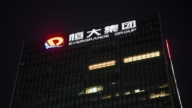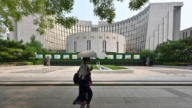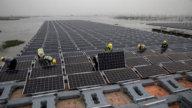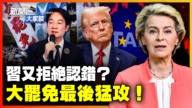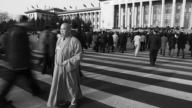【新唐人2012年5月15日讯】大陆央行宣布,从5月18号开始,下调存款准备金率。在此之前,当局发布的经济数据显示,4月份的经济增长严重放缓,各项经济指标普遍远低于预期。因此外界普遍认为,央行此举是为了增加货币供应、刺激经济保增长。但专家警告,中国经济的问题实际不是资金的问题。下面请看本台记者的报导。
5月12号晚间,大陆央行宣布,将从5月18号起,下调存款类金融机构人民币存款准备金率0.5个百分点。这次下调生效后,存款准备金率将降到20%。这也是今年以来的第二次调降,2月,央行曾经将存款准备金率下调0.5个百分点。
而根据国家统计局此前发布的经济数据,4月份大陆工业较去年同期增长9.3%,远低于12.2%的预期。同时,4月份的新增人民币贷款、固定资产投资、进出口等数据也都低于预期。中国经济增长已全面放缓。
《新唐人》特约经济评论专家杰森:“这很明显,就是中国现在是想用这种增加货币流通量的方式,下调准备金率就把市场上的货币数量增加了,这样的话,银行就可以多贷点款。它就希望借此来刺激经济。”
杰森分析指出,实际上中国经济的最大问题并不是资金不足。
杰森:“中国的问题不是资金的问题,中国的问题更多的是:产业结构的问题、内需不足的问题、通货膨胀可能引发的社会问题。所以说,目前(央行)这样的举措,释放信号的因素要远远大于实际的经济效果。”
刚刚获得美国“2012弗里德曼促进自由奖”的大陆经济学家茅于轼也对《新唐人》表示,中国的经济问题不单是存款准备金的问题。
茅于轼:“中国(经济)的根本问题是国家垄断。老百姓没有自由进入的权利,这使得中国的效率就大大降低了。我们现在人均GDP只有美国的几分之一,怎么赶上去呀?潜力大得很,但是必须得改,把这个垄断变成充分竞争。”
英国《金融时报》中文网,刊登“澳新银行”大中华区首席经济师刘利刚的分析也指出,“降准不是灵丹妙药”。他质疑,利率水平已经不断降低,但企业却并没有获得足够的信贷资源,真正获益的反而是债券市场。这是为什么呢?
茅于轼:“中国金融业的问题是不能钱尽其用、钱用得好。你准备金怎么调来调去,你不能解决这个问题,还是没用。金融业的根本任务就是钱尽其用,把钱用好了。你调这个准备金当然有点用,但是根本问题没解决。”
茅于轼指出,如果不改善资金支配和配置的效率,提高经济增长率就会引来通货膨胀。只有改善金融业的竞争状况,取消垄断,才可能兼顾经济增长和通胀。
在此之前,有媒体曾评论说,中共高层忙于18大权斗,因此而无暇处理目前的经济困境。
但经济评论专家杰森认为,大陆目前的经济状况是中国的经济模式长期累积的结果,和中共最近的权斗没关系。实际上,如果中共高层不去干预经济,中国经济会稳定得多。
采访/梁欣 编辑/李谦 后制/孙宁
Deposit Reserve Ratio Again Lowered Against Slow Growth
China’s Mainland Central Bank has announced a reduction
in the required deposit reserve ratio, starting from May 18.
Official data for April shows a serious slow of economic
growth—all economic indexes were far from expected.
The Central Bank’s policy is being widely read as an aim to
increase currency supply and stimulate economic growth.
Experts warn however, that China’s economic problem
is not a problem of currency.
Following an initial reduction of 0.5% in February,
the Mainland Central Bank announced on May 12 that
they will be reducing the RMB deposit reserve ratio
by a further 0.5% effect on May 18.
Thus, the deposit reserve fund rate
will be reduced to 20%.
China’s National Bureau of Statistics data shows that in April
the Mainland’s industries increased by 9.3% from last year, well below the expected 12.2%.
Increases in other areas—RMB loans, fixed assets investment,
import and export—are all below expected,
indicating an overall slowdown of China’s economic growth.
NTD economy critic, Jie Sen: “Obviously China is resorting to
increasing its currency circulation to stimulate economy.
Lowering the deposit reserve ratio means increasing the
currency on market, so banks will have more money to loan.
China hopes this will stimulate the economy.”
Jie Sen points out that China’s economic problem is not
one of having insufficient money.
Jie Sen: “China’s problem is not money but industrial structure;
lack of domestic demand and social consequences of inflation.
Therefore, the Mainland Central Bank’s policy
cannot achieve planned results.”
Mainland economist, Mao Yushi, winner of 2012 Milton
Friedman Prize for Advancing Liberty, also told NTD that
China’s economic problems are not just about
required deposit reserve.
Mao Yushi: “The fundamental problem of China’s economy
is state monopoly—
the denial of ordinary people’s access to
the market greatly reduced China’s efficiency.
China’s per capita GDP is only one quarter of that of America;
there’s enough potential for us to catch up, but monopoly
must be changed to free competition.”
The British Financial Times published a Chinese article titled:
“Lowering Deposit Reserve Ratio Is No Panacea”, written by
chief economist of ANZ Greater China District, Liu Ligang.
Liu Ligang expresses criticism that, lowered interest rates
do not bring companies enough credit resources, and only benefited the bond market.
Mao Yushi: “China’s financial problem comes from
inadequate and improper use of money.
It is useless to adjust the deposit reserve ratio without
solving this root problem—it’s no solution.
The fundamental task of the financial industry
is to make the best use of the nation’s money.”
Mao Yushi stated that Raising economic growth rates without improving
efficiency of the capital configuration will cause inflation.
Only by improving the financial industry’s competition state
can there be economic growth without inflation.
Media said earlier: the CCP is too busy with power struggles
at its 18th Assembly, to deal with the current economic plight.
Economic critic, Jie Sen, says China’s economic situation now
is the long-term result of China’s economic model—an issue
unrelated to the CCP’s current power struggle.
Jie Sen says, China’s economy would be much more stable
if the CCP officials did not intervene.


